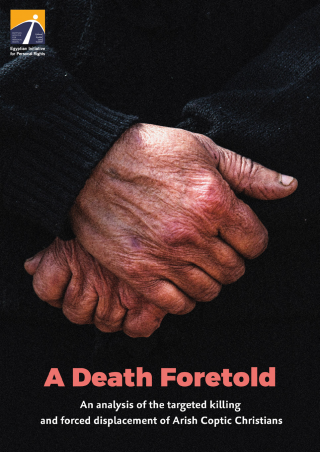Tags: Copts
What happened in Dimshaw Hashim is not a unique case, but a recurrent pattern in a number of governorates that has been going on recently, manifested in closing a number of existing churches and them being unable to settle their legal status.
The EIPR found that from September 28, 2016, when the church construction law was issued, to April 2018, state institutions have shuttered 14 existing churches that were hosting religious services prior to the closure orders. Four of these churches were closed this year, with Copts denied access to them and prayer services in them prohibited.
This report documents various ways in which North Sinai Governorate’s Coptic have been targeted. The report covers the past six years until the end of February 2017 and documents intimidating ranging from preventing the practice of religious rites, burning churches, attacking property, kidnap-for-ransom, to forced displacement and identity killings.
“The government has failed to deal with the issue of Christian-Muslim relations and sectarian attacks due to the dominance of a purely security mentality,” said Ishak Ibrahim
In a study titled “The Democracy of the Clergy,” a commentary on the proposed bylaws that criticizes the church’s drafting of the statute in closed, non-transparent consultations based on a narrow interpretation of Article 3.
The Egyptian Initiative for Personal Rights today renewed its warnings about the gravity of the wave of sectarian violence that has swept Egypt over the last few weeks and took a more severe turn with the dispersal of the sit-ins of supporters of
The Egyptian Initiative for Personal Rights (EIPR) today warned about the gravity of sectarian violence and incitement seen in several governorates since the massive demonstrations and marches of 30 June.




